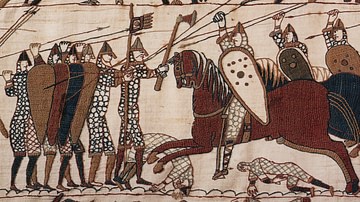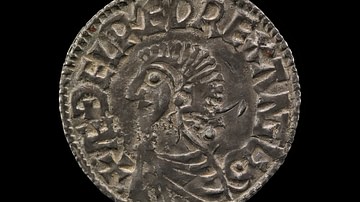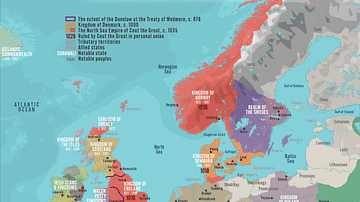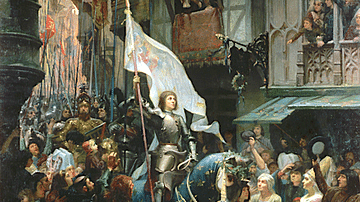Search
Search Results

Definition
Battle of Hastings
The Battle of Hastings in south-east England on 14 October 1066 saw the defeat of the Anglo-Saxon king Harold II (r. Jan-Oct 1066) by the invading Norman army led by William, Duke of Normandy (reigned from 1035). After a day of heavy fighting...

Definition
Bayeux Tapestry
The Bayeux Tapestry shows in pictures the events leading up to the Norman conquest of England by William the Conqueror, Duke of Normandy, and his 1066 defeat of King Harold Godwinson at the Battle of Hastings. It was produced between 1067...

Definition
Aethelred the Unready
Aethelred II, also known as Aethelred the Unready, was king of the English from 978-1013 and 1014-1016. His long reign was initially stable, but Viking attacks on England escalated from the 990s onward. Viking incursions eventually grew so...

Definition
Cadoudal Affair
The Cadoudal Affair, or the Pichegru Conspiracy, was a failed royalist attempt to kill or kidnap Napoleon Bonaparte (1769-1821), then the First Consul of the French Republic, and restore the House of Bourbon to the French throne. The conspiracy's...

Article
The Danish Conquest of England
The Danish conquest of England was not a singular event, but a series of large Viking invasions of England between 1013 and 1016, which eventually overthrew the native English dynasty. As a result, four kings from the House of Denmark ruled...

Definition
Hundred Years' War
The Hundred Years' War (1337-1453) was an intermittent conflict between England and France lasting 116 years. It began principally because King Edward III (r. 1327-1377) and Philip VI (r. 1328-1350) escalated a dispute over feudal rights...

Article
Causes of the Hundred Years' War
The Hundred Years' War (1337-1453) was an intermittent conflict fought between England and France that started when king Edward III of England (r. 1327-1377) squabbled with Philip VI of France (r. 1328-1350) over feudal rights concerning...

Article
William the Conqueror's Harrying of the North
By the end of 1066 CE William the Conqueror had won a decisive victory at the Battle of Hastings, subdued the south-east of England and been crowned King William I in Westminster Abbey but there remained rebellion in the air throughout 1067...

Definition
Battle of Agincourt
The Battle of Agincourt on 25 October 1415 saw Henry V of England (r. 1413-1422) defeat an overwhelmingly larger French army during the Hundred Year's War (1337-1453). The English won thanks to the superior longbow, field position, and discipline...

Definition
Charles the Simple
Charles the Simple (Charles III of France, l. 879-929, r. 893-923) was king of West Francia (roughly modern-day France) toward the end of the period of Viking raids in the region. His epithet `the simple' refers to his habit of being straightforward...